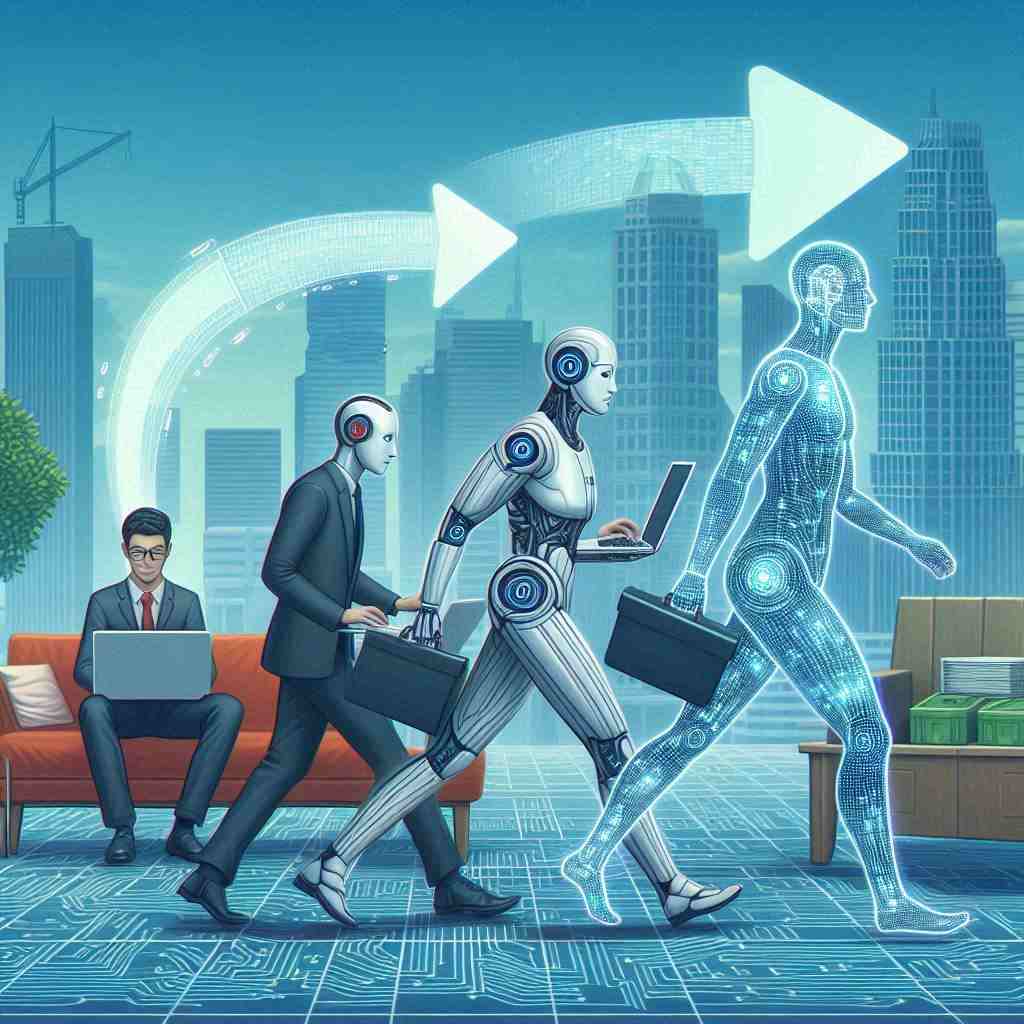The Future of Work: Alex's Journey Through the Changing Job Market

March 01, 2026
In the vibrant metropolis of NeoCity, Alex, a fresh college graduate brimming with ambition, stood at the dawn of his professional life. Little did he know that his journey would unfold in a world transforming at breakneck speed, driven by technological leaps, economic shifts, and evolving societal norms. This is the compelling story of Alex's quest to navigate the future job market, using foresight and adaptability to carve out his path to success.
Chapter 1: The Dawn of a New Era
Alex had always been a forward-thinker. From the moment he received his diploma, he knew that understanding future job market trends was crucial. He delved into research, identifying sectors poised for growth and the skills that would soon be in high demand.
Trend Insight: Automation and artificial intelligence (AI) were revolutionizing industries. Jobs in data science, AI, and cybersecurity were projected to surge. Alex, astutely observing these trends, began exploring opportunities in these burgeoning fields.
Chapter 2: Upskilling for the Future
Determined to stay ahead of the curve, Alex enrolled in online courses and attended workshops to gain skills in data analytics and machine learning. He understood that continuous learning was essential in a rapidly evolving job market. Alongside technical skills, he honed his soft skills—adaptability, problem-solving, and communication—knowing these were equally valued by employers.
Skills Development Tip: Embrace lifelong learning and proactively acquire new skills. Platforms like Coursera, Udemy, and LinkedIn Learning offer courses that can help you stay relevant.
Chapter 3: The Gig Economy
As Alex delved deeper into his research, he discovered the gig economy's growing prevalence. Freelancing, remote work, and short-term contracts were becoming the norm, offering both flexibility and unique challenges. Alex decided to dip his toes into the gig economy, taking on freelance projects to build his portfolio and gain diverse experiences.
Gig Economy Tip: Explore freelance platforms like Upwork and Fiverr for gig opportunities. Building a strong online presence and a portfolio can help attract clients.
Chapter 4: Networking in the Digital Age
Recognizing the importance of networking, Alex leveraged social media platforms like LinkedIn to connect with industry professionals, join relevant groups, and participate in virtual events. He understood that building a robust professional network could open doors to new opportunities and provide valuable insights into industry trends.
Networking Tip: Actively engage with your network by sharing relevant content, commenting on posts, and attending virtual networking events. Building genuine relationships can lead to career opportunities.
Chapter 5: Embracing Remote Work
The COVID-19 pandemic had accelerated the adoption of remote work. Alex saw this as an opportunity to collaborate with companies worldwide without geographical constraints. He set up a home office equipped with the necessary technology and honed his remote working skills, such as time management and virtual collaboration.
Remote Work Tip: Create a dedicated workspace, establish a routine, and use collaboration tools like Slack, Zoom, and Trello to stay productive and connected with your team.
Chapter 6: Sustainable Careers
Sustainability was becoming a significant focus for many companies. Passionate about environmental issues, Alex wanted to align his career with his values. He explored roles in renewable energy, sustainable development, and corporate social responsibility (CSR). By aligning his career with the growing emphasis on sustainability, Alex aimed to contribute to a better future.
Sustainable Careers Tip: Research companies that prioritize sustainability and explore roles that focus on environmental impact. Certifications in sustainability can also enhance your qualifications.
Chapter 7: The Importance of Mental Health
As Alex navigated the challenges of the job market, he realized the importance of mental health and well-being. The pressures of finding a job, upskilling, and adapting to new work environments could be overwhelming. Alex prioritized self-care by practicing mindfulness, staying physically active, and seeking support when needed.
Mental Health Tip: Incorporate regular breaks, exercise, and mindfulness practices into your routine. Don’t hesitate to seek professional help if you’re feeling overwhelmed.
Chapter 8: Navigating Economic Uncertainty
Economic fluctuations and uncertainties were a constant in the job market. Alex learned to stay informed about global economic trends and their impact on employment. He diversified his skill set to remain adaptable and prepared for shifts in demand. By staying flexible and resilient, Alex positioned himself to thrive even in uncertain times.
Economic Resilience Tip: Keep an eye on economic indicators and industry reports. Diversify your skills and consider multiple income streams to enhance job security.
Chapter 9: Leveraging Technology
Technology was at the heart of the future job market. Alex embraced digital tools and platforms that enhanced productivity and efficiency. He learned to use project management software, data analytics tools, and digital marketing platforms. By staying tech-savvy, Alex ensured he could meet the demands of modern employers.
Technology Tip: Stay updated with the latest technological trends and tools in your industry. Continuous learning and practical application of technology can give you a competitive edge.
Chapter 10: The Road Ahead
As Alex continued his journey, he remained optimistic and adaptable. He understood that the job market would keep evolving, and staying ahead required a proactive and flexible approach. By planning his career based on future trends, continuously upskilling, and maintaining a positive mindset, Alex was well-prepared to navigate the ever-changing landscape of work.
Future Planning Tip: Regularly reassess your career goals and stay informed about industry trends. Be willing to adapt and pivot as needed to stay aligned with the future job market.
Conclusion: Embracing the Future of Work
Alex’s journey through the evolving job market highlights the importance of foresight, adaptability, and continuous learning. By proactively planning his career based on future trends, he was able to navigate challenges and seize opportunities. His story serves as an inspiration for all job seekers to embrace the future of work with confidence and resilience.

